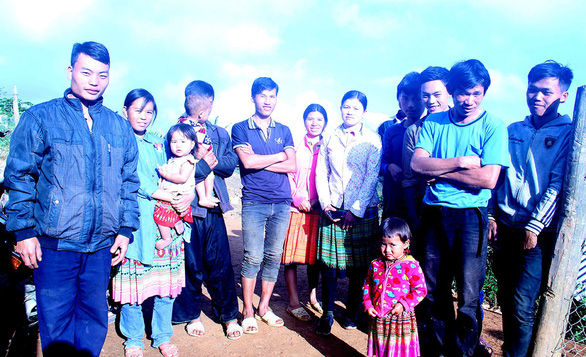A remote, poverty-stricken hamlet situated in the northern mountains of Vietnam has been hard at work educating its citizens about the dangers of drug use in a bid to defend the community against the grip that opioid addiction has taken on its people.
Buoc Pat Hamlet lies in the flanked valleys of Son La Province, just miles from the Vietnam-Laos border.
For generations, its villagers, mainly ethnic Hmong people, have made a living by farming and trading contraband, particularly drugs brought over from Laos where opium use is a major issue.
Now, local leaders are taking a shot at educating the community in the hopes of relieving the burden of addiction from future generations.
A recipe for devastation
Shortly before the sun begins to rise over the mountains near Buoc Pat, local Hmong people start to flock to the hamlet’s center, drawn in by a bonfire in front of Village Chief Mua A Cang’s house.
The bonfire is a weekly event for locals. Telecom companies have yet to move in on the area, so these gatherings are a means of staying connected and up-to-date on community news.
As usual, Cang, 37, opened the meeting by updating everyone on the current harvest season and the community goals for the coming week.
And then he turned his head towards the youth in the crowd. Changing his tone from an emcee to lecturer, he warned them against the dangers of drugs and the grip they’ve taken on the community.
Drug use has always been a major issue Buoc Pat Hamlet.
Mua A Lu is a local 17-year-old who is considered a rarity amongst his peers – he’s one of the few youth in the area who have never tried opium.
Mua A Lu’s isn’t shy about his disdain for drugs. He openly shares that his parents became addicted to opium shortly after they began working in Laos and eventually spent their life savings on the substance. His older brother has also fallen victim to opium, but in a much different way – he’s currently doing a 12 year stint behind bars for smuggling drugs.
In order to provide for himself and his younger sister, Mua A Lu left school after grade six. Though it’s common for rural Vietnamese to leave school early, being an ethnic minority whose first language is Hmong, not Vietnamese, means that most depend on education to learn the national language. As a result, Mua A’s ability to speak with non-Hmong is low and making negotiations with Vietnamese merchants is difficult.
“Even if life is hard, I will never turn to drugs!” Mua A Lu firmly stated as he shared his story.
When asked whether he would go over Laos to find work, the youth vehemently declined.
“It is easy to get addicted to drugs once you are in Laos. I will not go there,” he said.
Self-imposed regulations
According to Mua A Cang, there are countless locals who have been killed by or given jail sentences for drug use or smuggling.
Many have also return to substance abuse after finishing their rehab.
“To the impoverished people of Buoc Pat, the allurement of money stemming from drug trafficking is irresistible, especially when only a mountain stands in their way between here and the drug hotspots in Laos,” Mua A Cang explained.
Mua A Cang and his family are also victims of heroin addiction.
His father was addicted for 25 years straight – a situation which sent his family into poverty.
When he finally hit the dirt in 2012, this time, it was Mua A Cang’s nephew that was imprisoned for 20 years due to heroin smuggling.
“[My nephew] could not resist the charm of money. My elder brother was also sentenced to nine-years in jail because of drugs,” Mua A Cang said.
Mua A Cang is therefore more than motivated to encourage villagers to refrain from using drugs.
The village chief also seeks help from other prominent figures in the hamlet in order to sway the youths from relying on the substance for money.
Mua A Su, 31, secretary of the hamlet’s Youth Union, is among those who stand up for the idea.
“As many of the older generations died of drugs, there is no need to have any more of the younger generations getting involved in this perilous cycle,” Mua A Su affirmed.
In order to exterminate use and circulation of drugs for good, local authorities have spread knowledge about the addictive substance among the villagers, whereas the border guard unit have helped take care of local children, so their parents can work on the farm.
Sending the next generation to proper schooling, so that they in turn willingly stay away from addictive, is also among the initiatives being taken.
Like us on Facebook or follow us on Twitter to get the latest news about Vietnam!





















































